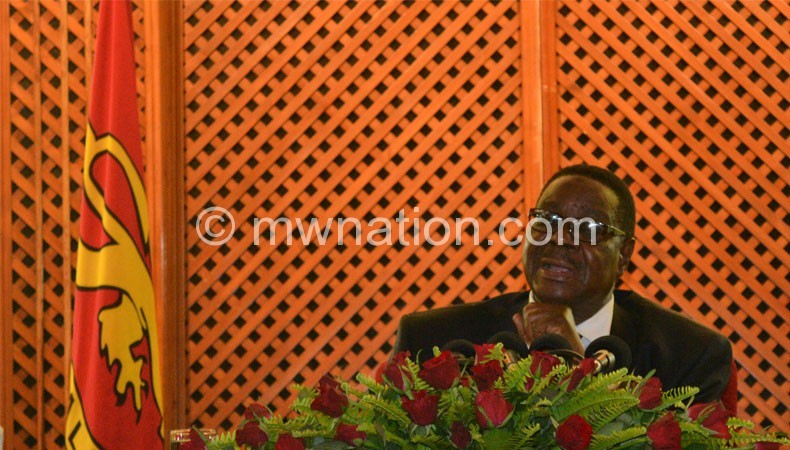Malawi President says ivory not for sale
Malawi President Peter Mutharika yesterday stated that government has no plans to sell the ivory which was earmarked for destruction until the last-minute intervention on Thursday.
Since government announced plans to burn the ivory valued at $5 million (K2.1 billion), there have been calls that government should instead use proceeds from the sale to put in place wildlife protection programmes or use it to replenish the forex situation of the country.

Speaking at a news conference at Kamuzu Palace in Lilongwe a day after his return from the Common Market for East and Southern Africa (Comesa) Summit in Ethiopia, Mutharika acknowledged the different views which have come out following the announcement, but said there is no legal market for ivory.
Mutharika denied that the destruction of the ivory has been put off for commercial reasons.
Said the President: “Ivory trade has been banned and there is no market for it. What happened late yesterday [Wednesday] is that we discovered that we have 2.6 tonnes in the court system and most of it is not from Malawi. Malawi is being used as a conduit.”
Mutharika alleged that there are big foreign cartels aided by Malawians who carry out ivory trade, warning that he knows them, but would not mention their names.
He was not clear on when the ivory would finally be destroyed because of the slow judicial system.
Speaking earlier during commemoration of World Wildlife Day, Mutharika said the burning of ivory was suspended until further notice pending court ruling.
He said: “Today we will not burn the ivory, I am told there is a court case on the same and once that is concluded, we will burn all the 6.6 tonnes together. The destruction of the ivory stockpile is not merely an action of government to protect the future of the country’s dwindling elephant population but also to send a strong signal to the rest of the world about Malawi’s commitment to the fight against wildlife crime.”
According to Mutharika, government’s declaration of zero tolerance to corruption symbolises an affirmation on a total war against wildlife crime.
“It should be clear in everyone’s mind that wildlife crime poses a very big threat to tourism development in this country. We all need to realise that wildlife is a mainstay of tourism. With increasing wildlife crime, any forex that wildlife-based tourism generates will definitely not be realised,” he said.
The Lilongwe Wildlife Trust, an organisation that has been campaigning against poaching of elephants in the country and championed the burning of the ivory, last week told our sister newspaper, Weekend Nation, that elephants may be driven to extinction within 10 years if current rates of poaching continue.
Jonathan Vaughan, director of the Lilongwe Wildlife Trust, said Malawi is a soft target for traffickers coming from surrounding countries looking to exploit the country’s historically weak law enforcement and use its transport networks to reach the Asian market.
In an interview on Tuesday, Vaughan said the four tonnes which were set to be burned yesterday is equivalent to 500 elephants.
He said some of the ivory Malawi will burn was impounded from traffickers who were using Malawi as a conduit.
Malawi is said to have a population of slightly over 1 000 elephants.
Commenting on the bilateral talks which he conducted during the summit, Mutharika said he met Rwandan president Paul Kagame who took an interest in the cement and malata subsidy programme because Rwanda has eliminated grass-thatched housing within 10 years.
He said the government would be sending officials to learn from the Rwanda programme, but Malawi would only achieve such a feat in 15 to 20 years.
Mutharika also said much as intra-Comesa trade has increased from $12 billion to $22 billion within six years under the Free Trade Area agreement, Malawi was yet to fully reap rewards from it because the country’s revenue was largely based on income and excise tax.





